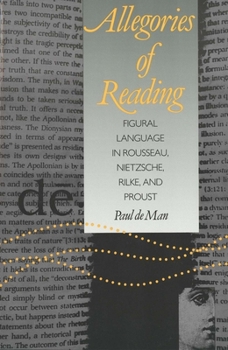Allegories of Reading: Figural Language in Rousseau, Nietzsche, Rilke, and Proust
Select Format
Select Condition 
Book Overview
This important theoretical work by Paul de Man sets forth a mode of reading and interpretation based on exemplary texts by Rousseau, Nietzsche, Rilke, and Proust. The readings start from unresolved difficulties in the critical traditions engendered by these authors, and they return to the places in the text where those difficulties are most apparent or most incisively reflected upon. The close reading leads to the elaboration of a more general...
Format:Paperback
Language:English
ISBN:0300028458
ISBN13:9780300028454
Release Date:September 1982
Publisher:Yale University Press
Length:320 Pages
Weight:1.22 lbs.
Dimensions:0.8" x 6.1" x 9.2"
Customer Reviews
4 ratings
For more support:
Published by Thriftbooks.com User , 17 years ago
I agree with Aaron C Sparenberg, and for further support suggest a reading of Dr. James Paxson's article "Historicizing Paul de Man's Master Trope Prosopopeia: Belgium's Trauma of 1940, the Nazi Volkskörper, and Versions of the Allegorical Body Politic," published in Historicizing Theory. Being at all familiar with de Man's work, one inevitably would understand how complex such issues can be, and would refrain from making such rash generalizations, particularly when the evidence at hand is printed materials -- as is quoted at the opening of The Allegories of Reading, "Quand on lit trop vite ou trop doucement on n'entend rien." The book itself is, as has been noted before, complex and filled with intense close readings of challenging texts. But these readings are truly rewarding when you reach a full understanding. (The end of each chapter tends to ignite a triumphant climax in which you at once understand how the intricacies of close readings reflect a grander picture of literature and the act of reading as we know it.) The Allegories of Reading deserves not one reading, but many close rereadings for full comprehension.
Nietzsche
Published by Thriftbooks.com User , 21 years ago
Genesis and Genelogy alone is worth five stars. If you don't believe me - read it.
Semantic is complex
Published by Thriftbooks.com User , 24 years ago
One of the best analyses upon the metaphor subject. The chapter about the Marcel Proust metaphors is pure light. Do not lose it!
A RESPONSE TO THE ABOVE REVIEW
Published by Thriftbooks.com User , 25 years ago
This is to serve as a rebutal to the earlier so- called review. De Man's war time involvement with the Dutch fascists was indeed unfortunate, as was Heideggar's espousal of nazism, as well Eliade's support of the Romanian fascists. This does not however take away from the beauty of their literary and philisophical works. Something that as a Jew I have had to grapple with. Derrida is an Algerian Jew, and was Paul de Man's close friend. His approach to reading is principly an ethical one. Perhaps you should turn your attention to his book on de Man. And perhaps also, you should reread the above book, or first read some other books on deconstruction, as your characterization of it was terribly off base. Deconstruction in it's Derridean form is extremely subtle, requiring a mental agility to grasp the closeness of it's readings. You would be doing yourself a service by reapproaching it more with an attentive honestness not exhibited in the above review. As to the book in question, I have always enjoyed Paul de Man's work, however if you are not familiar with continental philosophy it may not be the best opening into that world-Derrida, Delueze, Cixous and later Hedeggar may prove more stimulating and enjoyable.





